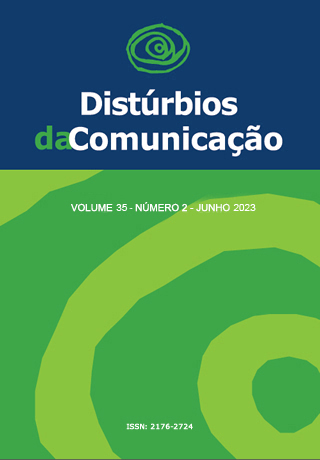Speech Therapy and Mental Health:
paths and impasses
DOI:
https://doi.org/10.23925/2176-2724.2023v35i2e58860Keywords:
Psychiatric Rehabilitation, Mental Health, Public Health, Language, Speech, Language and Hearing SciencesAbstract
Introduction: The Unified Health System was consolidated from the promulgation of the Federal Constitution of 1988. In the 70s and 80s, the speech therapist began to be inserted in public services, a movement that gained strength after the consolidation of the SUS. The Speech-Language Pathologist is inserted in the field of Mental Health in the 1990s, when his presence in the multidisciplinary teams of specialized outpatient clinics was established and in 2002 in the composition of the Children’s Psychosocial Care Center team. Thus, the role of the speech therapist in the field of Mental Health is still “new” and less discussed in the scope of Speech Therapy. Objective: reflect on the place of the speech therapist in Mental Health in the field of Collective Health. From the question: what are the paths and impasses to solidify the place of the speech therapist in the Specialized Psychosocial Care services? Method: non-systematic bibliographic review. The selection of articles was performed through automatic search in the following databases: SCIELO, LILACS and PUBMED. Discussion: when inserted in a service of the Unified Health System in the Psychosocial Care Network, speech therapists are faced with the precepts of the Psychiatric Reform, which point to another way of practicing, which makes a change in the speech therapist’s practice necessary. Conclusion: To solidify the role of the speech therapist in the field of Mental Health, it is necessary to invert the logic of care and establish the rationale of the Psychosocial Care clinic and the precepts of the Psychiatric Reform. The specificity of the speech therapist in this field is through a consistent theorization about language/communication that authorizes him to assume a position in relation to subjects in psychological distress.
Downloads
References
Brasil. Ministério da Saúde. Portaria n° 224, de 29 de janeiro de 1992. Regulamenta o funcionamento de todos os serviços de saúde mental. Diário oficial (da) República Federativa do Brasil. Brasília, DF, 29 Jan 1992.
Brasil. Ministério da Saúde. Portaria GM n° 336, de 19 de fevereiro de 2002. Define e estabelece diretrizes para o funcionamento dos Centros de Atenção Psicossocial. Diário oficial (da) República Federativa do Brasil. Brasília, DF, 20 Fev 2002.
Arce VAR. Fonoaudiologia e Saúde Mental: reorientando o trabalho na perspectiva da atenção psicossocial. Rev. CEFAC. 2014; 16(3): 1004-12. [Acesso em 01 de maio 2020]. Disponível em: https://doi.org/10.1590/1982-021620146613.
Trenche MCB, Oliveira RB, Vicentin MC, Pupo AC. Formação profissional em fonoaudiologia: o relato de experiência de uma estudante no programa de educação pelo trabalho - PeTSaúde - Saúde Mental. Distúrb. Comum. 2015; 27(3): 608-19. [Acesso em 01 de maio 2020]. Disponível em: https://revistas.pucsp.br/index.php/dic/article/view/22793/17734.
Brasil. Ministério da Saúde. Lei n° 8080, de 19 de setembro de 1990. Dispõe sobre as condições para a promoção, proteção e recuperação da saúde, a organização e o funcionamento dos serviços correspondentes e dá outras providências. Diário oficial (da) República Federativa do Brasil. Brasília, DF, 19 set.1990; Capítulo 2:3.
Brasil. Ministério da Saúde. Secretaria de Atenção à Saúde. Política Nacional de Humanização da Atenção e Gestão do SUS. Clínica ampliada e compartilhada. Série B. Textos Básicos de Saúde. Brasília, DF, 2010.
Hessel MB. A fonoaudiologia entre a objetividade e subjetividade: atuação em uma Enfermaria de Saúde Mental. Rev. Psicol. UNESP. [periódico na Internet] 2020 [acesso em 01 de junho 2021]; 19(especial): 267-89. Disponível em: https://doi.org/10.5935/1984-9044.20200023.
Barbosa CL, Alencar IBG, Mendes VLF, Souza LAP. Fonoaudiologia e escuta clínica em equipe de saúde mental: percepção de pais de crianças com Transtorno do Espectro do Autismo. Rev. CEFAC. 2020; 22(1): 1-13. [Acesso em 01 de maio 2020]. Disponível em: https://doi.org/10.1590/1982-0216/202022110819.
Barbosa CB, Lykouropoulos CB, Mendes VLF, Souza LAP Clinical listening, Mental Health Professionals and Speech-Language Pathology: experience in the Child and Adolescent Psychosocial Care Center (CAPSij). CoDAS. 2020; 32(6):1-9. [Acesso em 01 de junho 2021]. Disponível em: http://dx.doi.org/10.1590/2317-1782/20202019201.
Almeida BPB, Cunha MC, Souza LAP. Características e demandas fonoaudiológicas de pacientes adultos portadores de transtornos mentais e institucionalizados em um Centro de Atenção Integral à Saúde de São Paulo. Distúrb. Comum. 2013; 25(1): 27-33. [Acesso em 01 de maio 2020]. Disponível em: https://revistas.pucsp.br/index.php/dic/article/view/14921/11148.
Lipay MS, Almeida ECA. Fonoaudiologia e sua inserção na Saúde Pública. Rev. Ciênc. Méd. 2007; 16(1): 31-41. [Acesso em 01 de maio 2020]. Disponível em: https://seer.sis.puccampinas.edu.br/seer/index.php/cienciasmedicas/article/view/1073/1049.
Mendes, VLF. Fonoaudiologia e Saúde Coletiva: perspectivas de atuação nos serviços públicos de saúde. Distúrb. Comum. 1999; 10(2): 213-24. [Acesso em 01 de maio 2020]. Disponível em: https://revistas.pucsp.br/index.php/dic/article/view/11160.
Benini R. Dislalia e desvios fonológicos evolutivos: caminhos do fonoaudiólogo na abordagem das “alterações de pronúncias na fala. In: Lier-DeVitto MF, Arantes L. Aquisição, Patologias e Clínica de Linguagem. São Paulo: EDUC-FAPESP, 2006: 361-78.
Downloads
Published
Issue
Section
License
Copyright (c) 2023 Fernanda Fudissaku

This work is licensed under a Creative Commons Attribution 4.0 International License.









